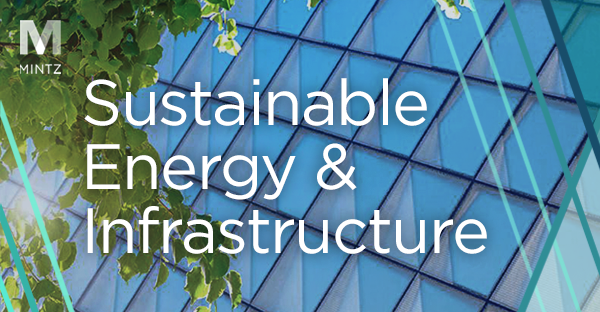Energy & Sustainability Washington Updates - December 2021
Bipartisan Infrastructure Bill Signed Into Law
President Biden has signed into law the Infrastructure Investment and Jobs Act (IIJA), the bipartisan infrastructure bill approved by the Senate in August and the House of Representatives in November. With a price tag of $1.2 trillion, the bill includes the five-year surface transportation reauthorization bill as well as $550 billion in new spending. A Senate Energy Committee summary of energy and energy efficiency provisions can be found by clicking HERE. The bill includes:
- $6 billion for battery storage split evenly between grants for materials and supply chain
- $7.5 billion for electric vehicle charging infrastructure
- $1 billion for a new Clean School Buses Program focused on bus fleet electrification
- $500 million to create public school energy efficiency codes
- $125 million for hydroelectric production incentives
- $553 million to incentivize capital improvements at hydroelectric facilities
- $120 million for new advances in manufacturing and industrial facility energy efficiency
- $500 million for clean energy demonstration programs including solar, microgrids, geothermal, advanced nuclear, storage, and direct air capture
- $65 billion for upgrades and modernization of the power grid
- $5 billion for a new competitive program focused on transmission, storage, and distribution infrastructure
- $355 million for demonstration and pilot projects focused on energy storage, advanced reactors, carbon capture technologies, and direct air capture technologies
- $2.5 billion commercial large scale carbon sequestration projects and related carbon dioxide transport infrastructure
- $1 billion for assistance to rural and remote areas
Applicant eligibility for IIJA funding varies by program and will be distributed through grants, loans, credit support, and matching grants. Funding opportunities from the IIJA will be made with a focus on creation of union jobs as well as meeting the legislation’s Made in America requirements. As the Administration works to get the new federal dollars out as expeditiously as possible, the first focus will be on dispersing formula funding to the states, and then moving toward standing up new programs and funding streams.
President Biden has named Mitch Landrieu – who previously served as lieutenant governor of Louisiana, mayor of New Orleans, and chairman of the U.S. Conference of Mayors – to serve as Senior Advisor and Infrastructure Coordinator, tasked with implementation of the IIJA. ML Strategies understands that each relevant federal agency will be hiring or identifying two key personnel to be detailed to Mr. Landrieu’s team to ensure a coordinated agency-wide implementation of the infrastructure law.
Read more from the Department of Energy on implementation of the infrastructure bill by clicking HERE.
Next Up: Build Back Better Act
After two failed attempts to pass the Build Back Better Act (BBB) over the summer, the House of Representatives approved the bill on November 19 by a vote of 220-212, with all Republicans voting against the measure and nearly all Democrats (minus one who opposed) voting in favor. At a price tag of roughly $1.75 trillion the bill is focused on “social infrastructure” and climate change. The House-passed BBB invests more than $550 billion to help address the climate crisis, including provisions to extend and expand clean energy tax credit; reduce greenhouse gas pollution; accelerate transition to clean energy; reduce carbon pollution in the transportation sector; promote zero-emission vehicles; lower energy costs and decrease residential and manufacturing emissions; accelerate climate and clean energy research and development; address environmental and climate justice; support rural development; and reform oil and gas fees and royalties, among other efforts.
The bill has been sent to the Senate for consideration, and Senate Majority Leader Schumer says he is aiming to pass the bill before Christmas. While not impossible, this is a very ambitious timeline given other pressing legislative priorities with upcoming deadlines including the annual National Defense Authorization Act, Fiscal Year 2022 appropriations, and the federal government’s debt limit. Look for long days in the Senate over the month of December.
Any amendments to the BBB in the Senate will likely be minimal so as to not jeopardize the bill when it is sent back to the House for a final vote following the Senate amendment process. The White House and Democratic leadership on Capitol Hill hope to have the bill passed and signed into law before the end of the year.
United Nations Climate Change Conference (COP26)
Seeking to reassert U.S. leadership on the climate crisis, in November President Biden attended the United Nations Climate Change Conference (COP26) in Glasgow, Scotland, along with other senior Administration officials and congressional leadership.
In his remarks at COP26, President Biden stated “When I talk to the American people about climate change, I tell them it’s about jobs. It’s about workers who will lay thousands of miles of transmission lines of clean, modern, resilient power grid. The autoworkers who will build the next generation of electric vehicles and electricians who will install a nationwide network of 500,000 vehicle stations to power them throughout my country. The engineers who will design new carbon capture systems, and the construction workers who will make them a reality. The farmers who will not only help fight global hunger but also use the soil to fight climate change. The communities that will revitalize themselves around new industries and opportunities.”
In preparation for COP26 the White House announced a number of efforts aimed at achieving President Biden’s climate goals, including the launch of a whole-of-government initiative – the President’s Emergency Plan for Adaptation and Resilience (PREPARE) – a coordinated approach to bring the United States’ diplomatic, development, and technical expertise to developing countries to adapt to and manage the impacts of climate change. PREPARE has three primary components: 1) Knowledge: Information is Power; 2) Plans and Programs: Mainstream and Integrate Adaptation, Build Relationships, Execute; and 3) Resources; Mobilizing Finance and Private Capital.
The White House also announced a new U.S. Methane Emissions Reduction Plan, another
whole-of-government initiative that will utilize all available tools – regulations, catalytic financial incentives, transparency and disclosure of actionable data, and public and private partnerships – to identify and cost-effectively reduce methane emissions from all major sources. The Plan will help the U.S. meet its obligations under the new Global Methane Pledge – an international agreement signed by 90 nations aimed at reducing collective methane emissions by no less than 30 percent from 2020 levels by 2030.
Read more from the White House on actions initiated by President Biden by clicking HERE.


